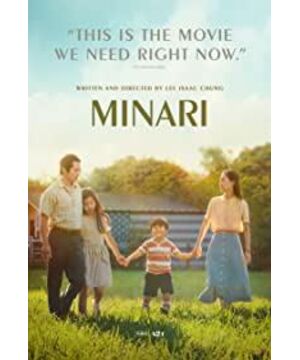Recently, "Minari" was screened in American theaters and won a good reputation. A year ago, the film won the Jury Award at the Sundance Film Festival. In this year’s Oscars’ various outpost awards, the film has frequently been on the list. Some commentators predict that the Korean actor Yoon Yoo Jung, who plays the grandmother in the film, is likely to rely on this film. Won the Oscar for best supporting actress. Since the main roles in this movie are all played by Korean actors or Korean actors, it is easy to give people the illusion that this is a Korean movie. But in fact, it is an authentic American film: The film is produced by A24, the country's most dynamic production company, and tells the story of a Korean immigrant who happened in the United States in the 1980s.
"Minori" (Minori) is a transliteration of water celery in Korean. At the beginning of the film, the camera followed a car to a simple prefabricated house. A family of four entered the house. The wife Monica (played by Han Yeli) apparently decided to stay here because of her husband Jacob (played by Steven Won). He was quite dissatisfied, and a pair of children were noncommittal about their new home. Soon after, my grandmother came to the United States from South Korea, and the life of the family began to slowly change. In the film, water cress "can be grown anywhere, just like weeds." Grandmother introduced water cress to David, not only because this plant symbolizes the common destiny of Korean immigrants, but also undoubtedly wants to be in the blood of different generations. Pass a certain ethnic complex between.
The American image of "movable board house" is very reminiscent of German director Werner Herzog’s 1977 masterpiece " Stroszek " ( Stroszek ). In this movie, the wandering artist Shi Chuxicong Germany came to the United States, from a German homeless man with an American dream to an American homeless man who had no chance to return home, and finally ended his life in despair. Compared to Shi Chuxi, the Korean immigrants in "Minari" are much luckier. They have jobs, families, and mutual support from their families... However, the family still lives in all sorts of troubles: the youngest son is born with insufficient mental strength The couple often fought hard because of housing problems. The Korean vegetables that Jacob grew could not find a seller for a long time, and his grandmother also suffered a stroke because of the living environment and the inadequacy of the water and soil. They live far away from the city, which also puts the family in a dilemma: they want to integrate into American life, but they also isolate themselves objectively.
"Minari" undoubtedly has a strong autobiographical nature: director and screenwriter Lee Isaac Chung (Lee Isaac Chung) himself grew up on a small farm in rural Arkansas. As a comparison between immigrants and Zhao Ting: both choose to photograph marginalized people in American society, one is a self-exiled woman living in a RV, the other is an immigrant family who moved from a RV into a "house on wheels", the former points to the 2008 economic crisis Later, the economic and mental state faced by Americans, the latter pointed to the long-standing immigrant’s status in American society. Both tried to outline the outline of the broader social groups below the middle class in the United States, and both gave us strong feelings. The sense of nomadism and wandering without a home.
Another character worthy of attention in the film is Jacob’s hired worker Paul. His exorcism passages and his religious beliefs are easily reminiscent of the 1974 horror film "The Exorcist" ( The Exorcist). Exorcist ) and the long- standing American exorcism legend. However, if the treatment of exorcism in horror films is more religious and mystic, then the director of "Minari" does not want to be mystic, but specifically disenchants it, giving us another reasonable explanation: the Korean War veteran Paul The pious belief in God is not only derived from the conservative folk customs in the southern United States, but is also closely related to his own experience-the war has left a huge shadow in his heart that cannot be eliminated, and the locals' ridicule of him further shows his deeds. The veterans have been abandoned by society in a marginal position.
Significantly, the rumors about Paul "where there is no water", "there is mud in his pores", and "shit in an iron bucket" are all ran out of the mouths of children who are so unbridled. Let us roughly guess what the local adults usually talk about. It is because of similar social status that Paul can get so close to the Jacobs family, although we can still see that there is not much trust between them.
To some extent, "Minari" also forms an interesting contrast with Korean local film works. At the end, Jacob’s warehouse and the Korean vegetables he carefully cultivated were reduced to ashes, and the deal just concluded with the restaurant could only be cancelled. This scene is hard not to remind people of Li Cangdong’s "Burning" (Steven Yuan’s starring adds another layer of contrast), but in this work, the plastic greenhouse was deliberately ignited. This move It clearly points to a kind of anger from the bottom. And "Minari" is obviously much warmer, and we can't even give any social meaning to this "burning". It is just a pure accident—a failure of my grandmother—maybe we can call it immigrants. Fate, perhaps in terms of the lowest values, the film is implying that Jacob is not pious enough, but this kind of plot arrangement makes the whole film lose some real criticality anyway. I have to say that this is the biggest regret left by "Minari".
After the fire, Jacob used the methods of the locals to find the water source and dug up cress beside the pond in the forest. The two scenes implied two diametrically opposite intentions: Korean immigrants wanted to go to the countryside and do what they were doing, while at the same time they wanted to keep themselves. The habits and traditions of the two seem to have reached an agreement and are in peace, but the contradiction has been completely shelved and shelved. Correspondingly, the contradiction between Jacob and Monica showed no signs of resolution. Even after the fire, Monica completely disappeared from the director’s shots, in a kind of "reconciled". State. A similar perfunctory treatment makes people want to ask, if Lee Isaac Zheng really wants to show the embarrassment of Korean immigrants' lives, if their lives are really so hopeless, why not learn from Herzog and Ken. Rocky, ask some sharper questions?
In the final analysis, the film shows us the difficulties but does not want to present it in depth. This in itself shows us the biggest embarrassment faced by immigrant groups in the United States, and also deeply reveals the overall conservative trend of the American film industry. It can only be said that American movies probably no longer need an Asian "Green Book", but need more combative and creative filmmakers and filmmakers like Spike Lee and "Escape from Death". Movie: The result of blindly perfunctory and lack of disclosure, I am afraid it will not be the reconciliation of contradictions, but the disillusionment of the conquest of the Capitol.
View more about Minari reviews











